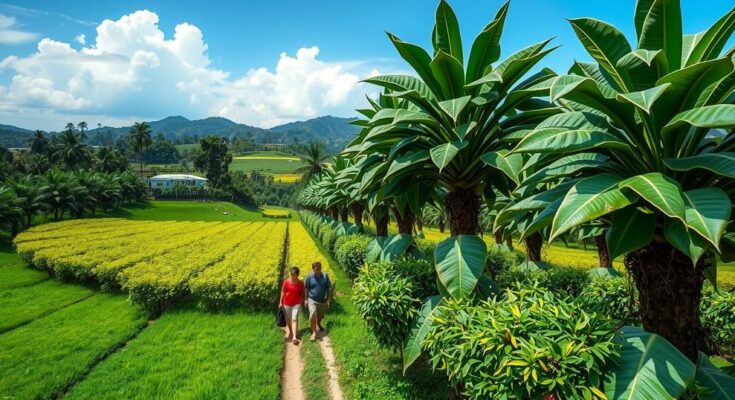Cocoa farmers in Indonesia are collaborating with businesses to mitigate the impacts of climate change and improve practices, as rising cocoa prices threaten their livelihoods. They are adopting sustainable methods and forming cooperatives to enhance productivity and secure financing. Continued cooperation may revitalize interest in cocoa farming despite challenges such as competition from other crops and access to loans.
In Indonesia, cocoa farmers are collaborating with businesses and organizations to combat the adverse effects of climate change and underinvestment that have escalated cocoa prices. Cocoa trees, which thrive near the equator, necessitate specific environmental conditions. As climate change disrupts these conditions, farmers face dwindling yields and pest outbreaks, prompting many to abandon cocoa cultivation for other crops, thereby exacerbating supply shortages and driving prices to unprecedented levels.
As the third-largest cocoa producer globally, following Cote D’Ivoire and Ghana, Indonesia is witnessing farmers like Tari Santoso partner with businesses such as Krakakoa to enhance their agricultural practices. By adopting effective techniques such as regular pruning and grafting, alongside agroforestry methods, farmers are striving to improve crop yields while integrating diverse crops for a sustainable ecosystem. Santoso noted significant improvements post-collaboration, stating that training received from Krakakoa greatly benefitted his farming approach.
Krakakoa has facilitated training for over 1,000 cocoa farmers and provides crucial financial assistance. Additionally, Santoso’s cooperative offers low-interest loans to its members, with repayments benefiting the cooperative rather than external banks. Partnerships with businesses also enable cocoa farmers to secure loans by providing collateral through guaranteed buyer agreements, as highlighted by Armin Hari from the Cocoa Sustainability Partnership.
Efforts are underway with various stakeholders, including government bodies and NGOs, striving to support cocoa farmers in dealing with climate challenges. Innovations such as new cocoa variants developed in collaboration with Mars illustrate ongoing efforts to boost productivity. However, Rajendra Aryal, the FAO’s country director for Indonesia, warns that cocoa farming may not attract young farmers, who are increasingly opting for more lucrative crops like palm oil, citing access to loans as a persistent issue.
Despite these challenges, Aryal maintains optimism regarding the prospects for Indonesia’s cocoa sector, asserting that collective efforts can rejuvenate interest in cocoa farming. He believes that addressing the farmers’ core challenges can make the sector appealing again, highlighting the potential for new opportunities amidst existing obstacles.
In summary, Indonesia’s cocoa farmers are actively seeking solutions to combat the dual challenges of climate change and financial instability through collaboration with businesses and organizations. By implementing innovative agricultural practices and forming cooperatives, they are striving to enhance crop yields and economic stability. Although obstacles remain, the efforts being made offer a glimmer of hope for revitalizing the cocoa farming industry in Indonesia.
Original Source: www.local10.com




